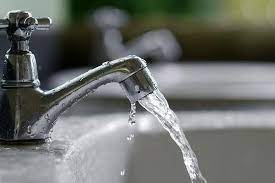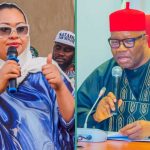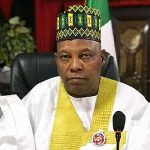Minister Identifies Challenges Responsible For Implementation Of National Water Resources Master Plan
Latest Headlines, News Across Nigeria Friday, April 29th, 2022
(AFRICAN EXAMINER) – Nigeria’s Ministry of Water Resources has said that the Implementation of the nation’s National Water Resources Master plan has been so poor ,26 years after it was developed, due to lack of political will and weak implementation Structure.
Minister of Water Resources, Engr. Suleiman Adamu, who stated this in Enugu Thursday, noted that the water plan developed in 1995 between Nigeria and Japan had also suffered from poor budgetary provision and appropriations, weak synergy between stakeholders and lack of understanding of the expected roles of the various stakeholders.
He equally identified other challenges of the plan to include; increase population growth leading to increase in water demand; uncoordinated water resources development among the three tiers of Government
Other barriers according to him, are, Development Partners and end users; over abstraction of ground water resources in some parts of Nigeria owing to uneven distribution of rainfall across the country; and impact of climate change.
He disclosed that the National Water Resources Master Plan was developed by the Ministry in collaboration with Japan International Cooperation Agency (JICA) in 1995.
He said it was the first comprehensive development plan aimed at optimizing the nation’s water resources as well as financial and economic investment opportunities in water resources development and management, agricultural production and food security.
“It was reviewed in 2013 with the support of the Japanese Government to a more integrated and sustainable approach for the growth and management of the nation’s water resources.
Speaking during a sensitization workshop of stakeholders in the water sector drawn from southeast and south-south geopolitical zones, the Minister stressed the need for continuous engagement on the plan with a view to making water available to Nigerians at all times.
He also identified some of the critical issues highlighted in the revised Master plan to include; Projection of future water demand -projected population of 154.4 million in 2010 to 257.8m in 2030, adding that it would include domestic, commercial and industrial water challenges.
“It is important to state that the overall water sector development is being guided by the National Water Resources Master Plan, and its implementation must be in partnership with states, local governments, line ministries as well as the private sector amongst others”, he said.
The Minister who spoke via a Director, Water Resources and Technical Support Services in the Ministry of Water Resources, Mrs Alice Ojowu, explained the workshop “is therefore an opportunity to evaluate the level of implementation of the National Water Resources Master Plan at all levels of governance preparatory to the review of the document proposed to hold during the 3rd quarter of this year.
According to him, ” We expect States which have already commenced the implementation of the 2013 Master Plan to share their experiences, key constraints or challenges and possible recommendations on the way forward to form part of the input into the planned review which is long overdue.
Your input will enable us build a robust database on the level of implementation of the Master Plan” he stated.
He said ” It may interest you to know that more than forty percent of the universal populations depend on shared waters for their livelihoods, creating strong inter-dependencies between people, economies and ecosystems.
“Let me inform you that there are two main surface water bodies in Nigeria, namely the River Niger and Benue which are trans boundary in nature.
“Another trans boundary water body is the Lake Chad shared by four (4) countries. Cooperation in the management of these water bodies is essential to ensure environmental sustainability, economic growth, and conflict prevention.
“It is therefore, imperative for adequate legal and institutional cooperation framework to be put in place for effective cooperation and management of these Trans-boundary waters.
The Workshop is being attended by key Stakeholders in the Water Resources Ministries from all the South East and South- South states Zones of the country.
Related Posts
Short URL: https://www.africanexaminer.com/?p=76291























